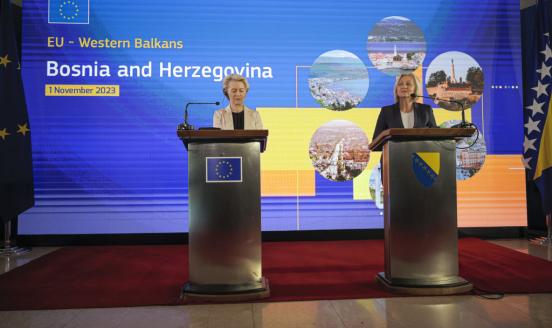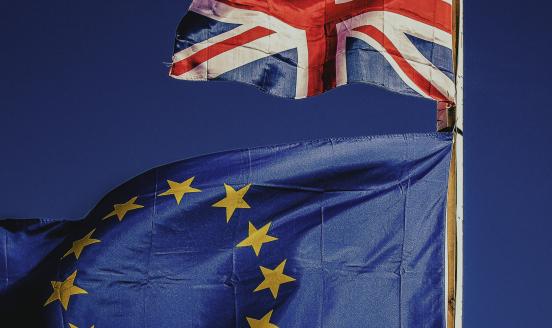Financial Times - Bruegel Forum: the future of Europe after the French election
The second event in the Financial Times - Bruegel Forum series will look at how the results of the French elections will affect Europe.
Speakers
Video and audio recording
NOTES
On 11 May Bruegel and the Financial Times held an event to discuss the direction Europe is likely to take after the French elections. Guntram Wolff, Director of Bruegel, and Tony Barber, Europe Editor of the FT, had the opportunity to discuss the challenges and opportunities facing France and the EU with Jean Pisani-Ferry, Director for Programme and Ideas of Emmanuel Macron’s presidential campaign.
Tony Barber kicked-off the debate with some remarks on the reactions to Emmanuel Macron’s election. Despite his victory at the second turn, larger than expected and welcome with great relief in France, he warned about the wide domestic hostility, expressed in the substantial ballots for extreme candidates in the first round, to some of the economic reforms proposed in his program. At the European level, he highlighted the differences between the overwhelmingly positive reactions in Western Europe and EU institutions and those extremely aloof in Eastern European governments. In this regard, while the election of Macron will certainly represent a new impetus for a healthier Franco-German relationship to strengthen the Euro area, the pockets of reserve and scepticism coming from the rest of EU should be kept in mind.
Despite these concrete challenges, Jean Pisani-Ferry emphasized the significance of this election. Emmanuel Macron broke with the longstanding tradition of avoiding European issues in a Presidential campaign, due to the internal divisions within both parties. In these elections, instead, particularly in the second round, there were two opposing candidates, with platform defined against or pro-Europe. A novelty for France, but also for European politics itself.
At the same time, the vote crystallized profound divisions within the country (by education level, by location and in particular by personal perception about the future), similar to those emerged in the Brexit vote and the US election. Mr Pisani-Ferry explained that it will be a priority for Macron to address these divides. And given his commitment, he will not speak only to the “happy France”, but will be demanding at domestic and European level to respond to the fears and anger expressed during the campaign.
Regarding reforms, Mr. Pisani-Ferry noted that, even if reluctance was clearly expressed in the first round, the current status quo is politically unsustainable (in terms unemployment level, divide between large and smaller cities, problems of competitiveness). Political capital, both domestically and at European level, has to be invested wisely in reforms that are going to deliver. More generally, given that the risk of facing a more competitive “champion” against openness and integration can not be underestimated (in the future or in another country), redefining the idea of economic openness and open society in a way that is politically more sustainable is a key challenge for the future of European politics.
In response to some remarks by Guntram Wolff on Macron’s public finance strategy and regional policies to tackle the opportunity gap between urban vs. countryside, Jean Pisani-Ferry provided more details on the planned structural reduction of public spending. To allow it, given the available low-interest rate window, the program envisages additional (but temporary) investments for 50 billion euros over the presidential 5-years term to foster the digitalization of public administration and improving efficiency of healthcare system. Regarding the geographical divides (well described here by the Financial Times), addressing the inclusiveness issues created by economic agglomeration will require changes in housing tax, the educational system and the degree of physical and digital connectivity.
Finally, a great part of the debate concerned the European dimension of the program. He made it clear that the agenda will starts at home with solving homegrown problems with domestic policies. “There is no attitude of telling neighbours or telling partners that they should be solving our problems,” he said. At the same time, the current outcomes of the Euro Area institutional set-up are rather unsatisfactory. In light of this, what is essential according to Pisani-Ferry is a serious discussion about the remaining shortcomings, not only on the few issues on which consensus can be found in the short-term and in particular not on instruments. “There has been a lot of crisis management and last-minute decisions to prevent very bad things happening, but we have lacked a serious discussion”, he noted, “in which we don’t need to agree on everything”. In this regard, the French red lines will be complacency, inaction, dogmatism.
The discussion continued on the consequences of Brexit on the EU budget, the necessary redefinition of its strategic priorities and on proposal about a policy framework to address security consequences of foreign acquisitions (on which Bruegel advanced some proposals).
Several questions from the audience fostered further the debate on European values, the sequencing of flexicurity reforms, the future French position on Brexit, issues related to labour mobility within the Single market.
Event notes by Filippo Biondi, Research Assistant.






